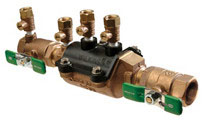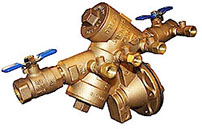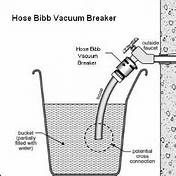What is a Cross Connection?
A cross connection is any physical connection between a public or consumer’s water system and any source of non-potable liquid, solid, or gas that could contaminate the potable water supply by backflow.
What Is Backflow?
Backflow is the undesirable reversal of the flow of water from its intended direction in a pipeline or plumbing system. It can result from a loss of pressure in the public water system (for example, due to a large leak), which can in turn draw non-potable water from the customer’s property (fire sprinkler systems, irrigation systems, hot tubs, etc.) into the water system at unprotected cross connections. Prevention of backflow at cross connections (“cross connection control”) is critical to protecting public health.
What Am I Responsible For?

Per WAC# 246-290-490, property owners are required to install and maintain backflow prevention assemblies where they are needed.
About Backflow Assemblies
A backflow assembly is a mechanical device required by law to protect public health and is installed on a customer’s property to prevent contamination from entering the potable water supply. Common types of assemblies include:

- Double Check Valve Assembly-DCVA
- Reduced Pressure Backflow Assembly-RPBA
- Pressure Vacuum Breaker-PVB
Where Is a Backflow Assembly Required?
A backflow assembly is required wherever there is a possibility of a cross connection between the public water system and a non-potable water source. Examples include, but are not limited to, irrigation systems, boilers, hot tubs, and other water-using equipment.
Cross-Connection Control and Backflow Prevention at WA State Department of Health
Tips To Prevent Outdoor Faucet Backflow

The easiest and best way to protect your family is to install vacuum breakers on all outdoor faucets. Vacuum breakers completely prevent backflow through outdoor faucets and are available at all major home improvement stores for around $5 each. All Homes built in 1996 and after per plumbing code, already have vacuum breakers on outdoor faucets.
If you choose not to install vacuum breakers make sure you:
- Never leave a hose submerged in a bucket of water —
 submerging briefly can make a big difference
submerging briefly can make a big difference - Hold hoses above the water line when filling pools, hot tubs, etc.
- Do not use fertilizer sprayers
